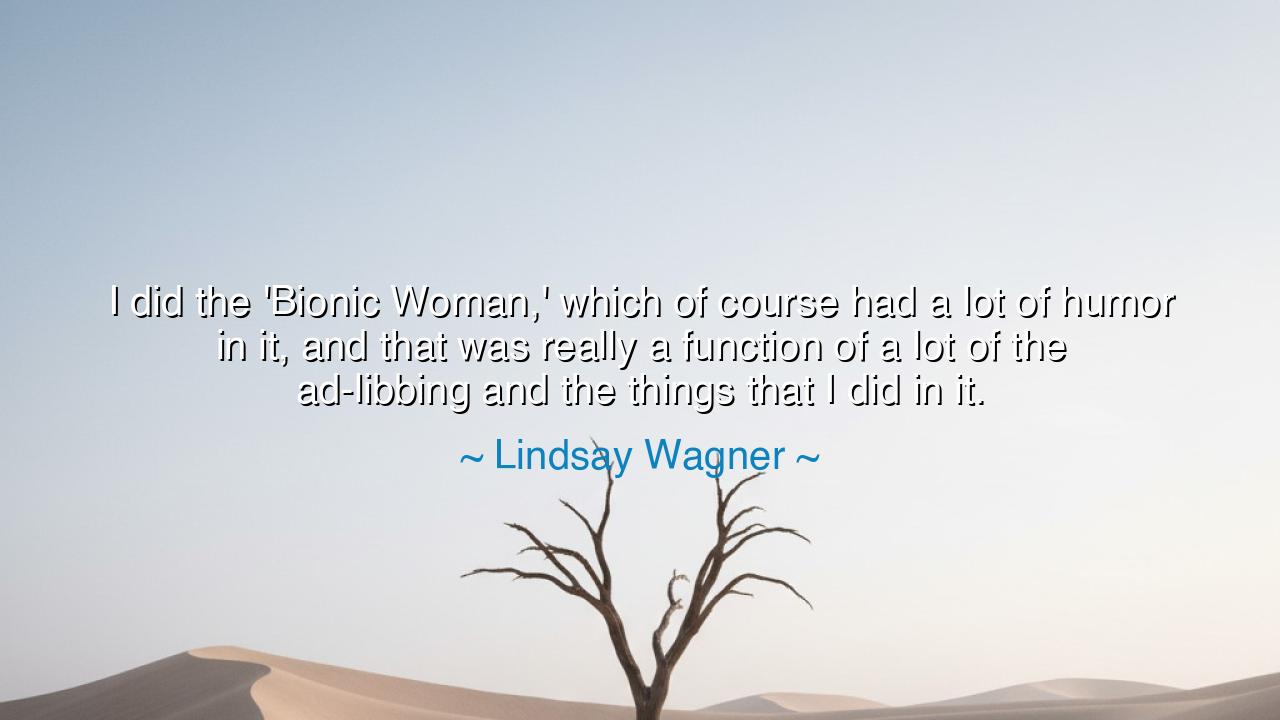
I did the 'Bionic Woman,' which of course had a lot of humor in
I did the 'Bionic Woman,' which of course had a lot of humor in it, and that was really a function of a lot of the ad-libbing and the things that I did in it.






"I did the 'Bionic Woman,' which of course had a lot of humor in it, and that was really a function of a lot of the ad-libbing and the things that I did in it." These words, spoken by the remarkable Lindsay Wagner, echo a profound understanding of the alchemy of performance—how humor and spontaneity can transform a story into something that resonates with the soul. In her iconic role as the Bionic Woman, Wagner brought more than just strength and heroism to the screen; she infused her character with humanity—a willingness to embrace imperfections and laugh in the face of both triumph and tragedy. This simple act of ad-libbing, of bringing life and humor into a story, reveals the essential power of improvisation in art and in life itself.
In ancient times, the greatest heroes were not only those who demonstrated great courage or wisdom, but those who could laugh in the face of adversity. Heracles, the mighty Greek hero, was known for his strength, but he was also celebrated for his ability to find humor even in the most difficult of his Twelve Labors. When he wrestled the lion of Nemea, or faced the wrath of the gods, his humor and cleverness became his shield. It was not his muscles alone, but his ability to adapt, to take the unexpected and turn it into something endearing, that made him a true hero in the eyes of the people. In the same way, Wagner’s portrayal of the Bionic Woman was not just about her superhuman abilities; it was about how she made those around her laugh, even when the world seemed dark and threatening. Humor, she realized, was just as powerful as strength.
Consider the role of the comedian in ancient society—Aristophanes, the master of Greek comedy, used humor not merely for entertainment, but as a way to cut through the veils of pretense and expose deeper truths. His plays often made fun of the gods, the powerful, and the heroes of his time, but through that humor, he offered profound critiques of society. Wagner’s Bionic Woman, with her mix of seriousness and lightheartedness, carries this ancient tradition forward. She too, by embracing humor within her role, found a way to critique the world around her—not through bitterness or anger, but through laughter. The message was clear: even in the face of great challenges, we must remember the power of joy and laughter to shift our perspective and find meaning.
Therein lies the wisdom of spontaneity in life. It is easy to become rigid, to hold on too tightly to the script that life gives us. We are taught to plan, to prepare, and to control every aspect of our world. Yet, in doing so, we often lose sight of the beauty that comes from allowing the unexpected to enter our lives. Wagner’s ad-libbing, her ability to respond to the moment and create humor out of nothing, shows us that flexibility and playfulness are often the key to navigating the complexities of life. When we approach our struggles with a light heart, we are better equipped to face them. The unexpected is no longer something to fear, but an opportunity to grow, to laugh, and to evolve.
Take, for example, the great Leonardo da Vinci, a man who embodied both the discipline of science and the freedom of art. He, too, found the magic of life in the space between rigidity and spontaneity. His art was not just a technical achievement; it was a blend of deep thought and the freedom to express his inner thoughts in the most unexpected of ways. The Mona Lisa, with her mysterious smile, invites us into a space of humor and mystery, an enigmatic moment that defies explanation and yet draws us in. Da Vinci understood that the greatest creations come not from preparation alone, but from the freedom to improvise, to embrace the unknown with curiosity and humor. In this way, Wagner’s humor in "The Bionic Woman" becomes a living tribute to this legacy.
As you journey through your own life, consider the lessons embedded in Wagner's words. Understand that humor is not just an accessory to life, but a vital force that can transform our most difficult moments into opportunities for growth. In a world that often demands perfection, we must remember that the strength of our character lies not in how perfectly we execute every plan, but in how willing we are to embrace the unexpected, to laugh at ourselves, and to share that laughter with others. Spontaneity and humor can change the direction of our journey, helping us navigate the trials and challenges of life with a lighter heart.
So, dear listener, I charge you: when the weight of life becomes too heavy, when the path ahead seems unclear, find humor in the unexpected. Like Wagner and the great figures of old, turn to ad-libbing, to improvisation, and let it be your guide. Laughter is not a sign of weakness, but a weapon of strength—one that will carry you through the darkest of times. Embrace the unpredictability of life, and let humor be the thread that weaves your story forward, one spontaneous moment at a time. In doing so, you will discover the greatest power of all: the ability to transform the world around you with nothing more than a smile.






AAdministratorAdministrator
Welcome, honored guests. Please leave a comment, we will respond soon